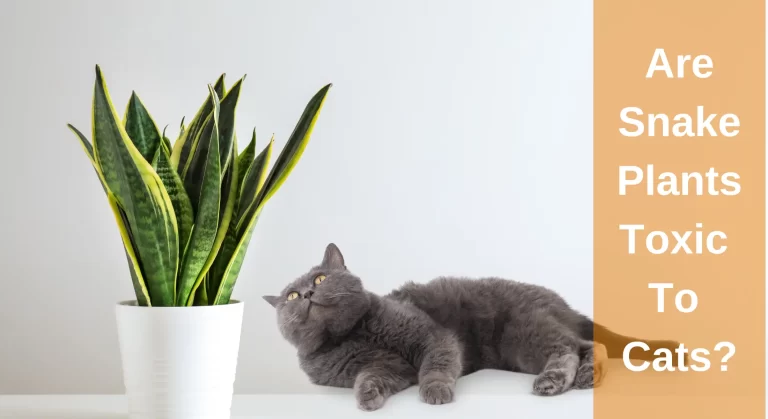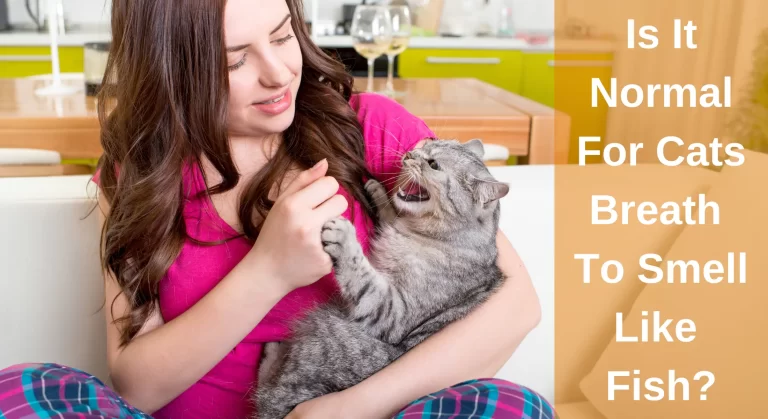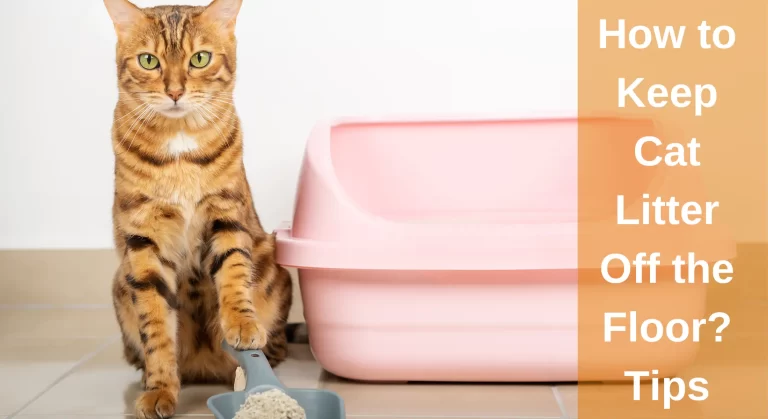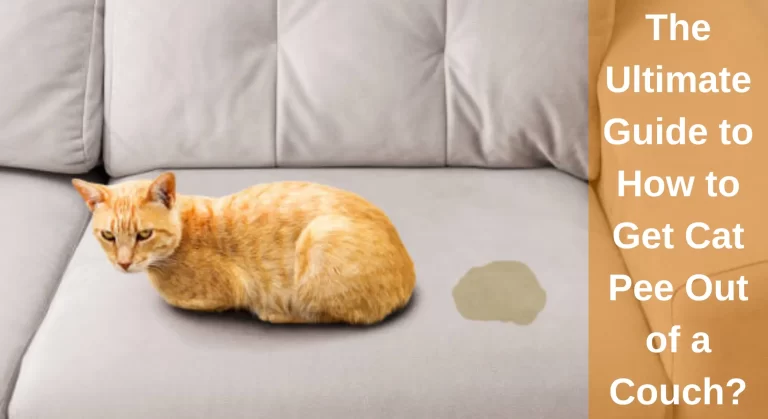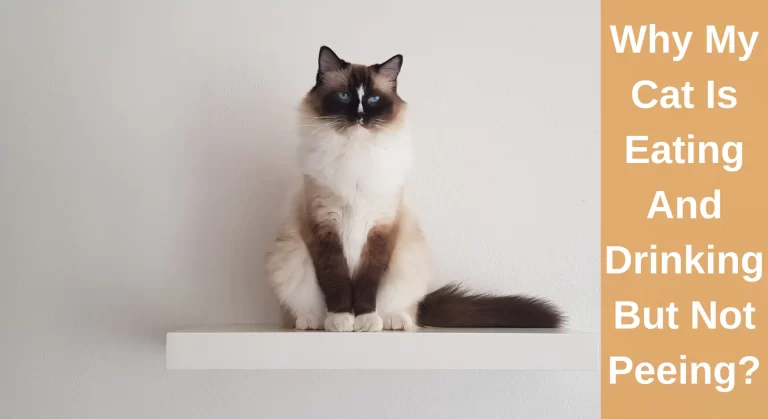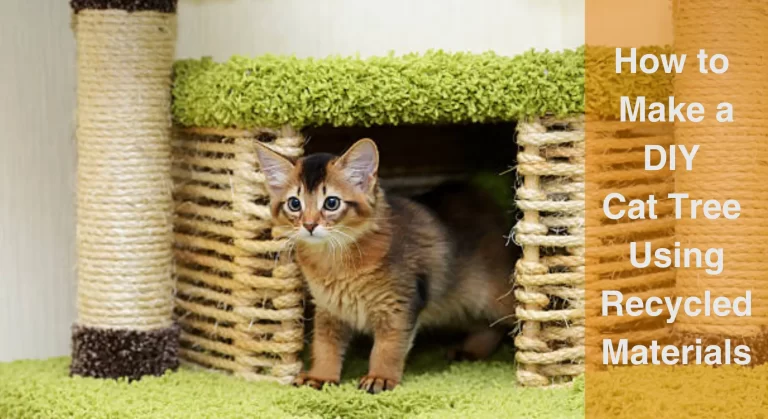How To Comfort A Dying Cat? Ways to Provide Peace and Love in Their Final Moments
When your cat reaches the end of its life, it is a sad and upsetting moment. You’ll want to provide the most comfort and relaxation for your cat as its owner when your pet buddy reaches near death. You’ll need to take action to help your cat deal with the situation and feel more at ease because it’s doubtful that it can take care of itself.
So, How to comfort a dying cat? The best thing you can do for a dying cat is to provide a peaceful, tranquil environment to live in, without other pets and loud distractions. You can reward your cat with treats if it has stopped eating to encourage it to regain some energy. Because of the pain and discomfort cats may not want to be handled, taking time to pet and chat with your cat will make him much more relaxed and comfortable.
The last days of your cat’s life can be extremely difficult, and it is important that you stay with him, even though it is heartbreaking to see him suffer.
In this article, we will list some critical signs that indicate your cat’s health is declining; by recognizing these signs, you will know when your cat needs special care and comfort, so preparing for that moment can be easier.
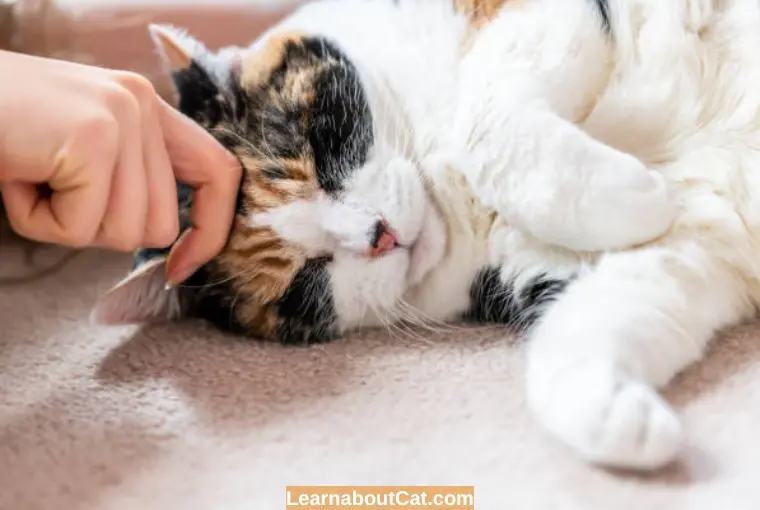
Signs Your Cat Is Nearing the End of Their Life -Symptoms of A Dying Cat
Some cats pass quite unexpectedly, while others decline over a brief but noticeable period of time. The following dying cat phases can be seen in your cat at that period, among other adjustments to look and behaviour:
1. Sour Odours
Your cat could experience an unusual bodily odour before passing away because of the breakdown of tissues and the buildup of toxins. Depending on your cat’s health issues, the fragrance may range from being sickly sweet to disagreeable, like ammonia.
For example, if your cat is experiencing kidney failure, their breath may smell like ammonia. On the other hand, cats with diabetes or liver disease may have a sweet or fruity odour to their breath.
If you notice a change in your cat’s body odour, it’s important to talk to your veterinarian. Managing your cat’s discomfort and ensuring they are comfortable in their final days is crucial. Your veterinarian may also provide recommendations on how to care for your cat and manage any symptoms or discomfort.
2. Lethargy
As it gets closer to the end of its life, your cat will become less active. It won’t have much energy left to move it may become weak, so it will sleep a lot and save what energy it does have.
The cat will seem frail and, perhaps, sluggish when it awakens. They may not have the energy to move around or play like they used to. This can be a result of age-related changes or an underlying illness.
Also Read: My Cat Has a Fever and is Lethargic: Sings of Fever in Cats
3. Loss of Weight
Your cat’s sudden weight loss is one of the first indications that it’s near to passing away. Senior cats frequently lose weight because, as they age, their muscles no longer work as well. The muscles become less defined due to the body’s less effective food and protein digestion. Even if your cat eats, it will still lose weight.
The weight loss can become extreme over time, with exposed bones, such as the ribs, spine, and hips, visible underneath the skin in some old or sick cats
Cats with diabetes, kidney disease, cancer, hyperthyroidism, and gastrointestinal disorders often experience weight loss.
Check Out: Why Is My Cat Always Hungry But Skinny?
4. Loss of Appetite
In addition to losing their appetite and refusing to drink, ill or dying cats frequently suffer from acute dehydration. They may be experiencing this due to a variety of reasons, including changes to their metabolism or dysfunction of their organs.
Some drugs also impair their sense of taste and smell, making them unable to enjoy meals. Sadly, if your cat doesn’t eat, it may become even worse.
Try warming up your cat’s regular food if it seems like it has lost its appetite. To make it more delicious, add some tuna juice. A veterinarian can also provide drugs to treat motion sickness and promote feeding if this doesn’t help.
Also, Check Out: Cat Not Eating or Drinking- How Long Can a Cat Survive?
5. Lower Temperature of the Body
If your cat is having trouble regulating their body temperature, it could be a sign that its body is starting to shut down. They may feel cold to the touch, even when in a warm environment, or have a fever that won’t go away.
The body temperature of a healthy cat is roughly 100 degrees Fahrenheit, while that of a dying cat might drop significantly. A thermometer may be used to check the temperature of your cat.
6. An Untidy Appearance
When a cat is close to passing away, they cease grooming itself, which causes its coat to become oily and untidy. Mats form on long-haired cats‘ bellies, tails, and hind ends. Additionally, the skin is flaky and dry. This can be a sign that they are too weak to groom or that they are in pain.
If you notice that your cat’s appearance is becoming increasingly unkempt, it’s important to talk to your veterinarian. They may provide pain management, nutritional support, and assistance with grooming.
7. Behavioural Alterations
The latter phases of a dying cat’s life cause them to act differently. Although each cat has a unique personality and temperament, your cat may start working substantially differently, which can be difficult for owners to handle.
Pain makes cats irritated and aggressive because it makes them feel uncomfortable.
8. Shallowly Breathing
When cats are in the last phases, their lungs weaken and cause irregular breathing. Additionally, when the muscles try to contract, they start breathing rapidly and shallowly, speeding up and slowing down. If you think your cat’s breathing may be becoming worse, keep an eye out for these indicators:
- Mouth open during breathing
- Irregular abdominal motions
- Extending the neck and head
These signs point to a crisis that their body is starting to shut down and they may not have much time left. So, to spare your cat from needless misery, you must get to the vet.
Find Out: Why Is My Cat Breathing Heavily While Resting
9. Poor Response to Treatments
Poor response to treatments is another sign that a cat may be approaching the end of their life. If a cat is receiving treatment for an illness or condition but is not responding well, it may be a sign that its body is no longer able to fight the illness or that the treatment is no longer effective.
This can be a difficult realization for pet owners, but it’s important to understand that some illnesses may not be curable.
10. Hiding
When ill or near death, cats tend to hide more frequently. They do this because they don’t want to be touched or disturbed and are driven by pain or discomfort.
If your cat begins to hide more regularly or in locations where it never has before hidden, there is a problem, and it needs to be left alone. It’s better to avoid trying to coax your cat out of hiding since it craves alone.
11. Reduced Function of Mobility
Senior cats slow down and quit moving as frequently as they once did in the last phases. Several factors, such as weakness or muscular atrophy, can cause this.
As your cat’s health declines, it may have trouble moving around. They may become unsteady on their feet or have difficulty jumping onto furniture.
One of the most prevalent diseases that impair movement is arthritis. It becomes hard to accomplish things like climbing stairs and entering and exiting the litter box.
How To Comfort A Dying Cat? Things To Consider
If you’re caring for a dying cat at home, it’s essential to provide comfort and support. Here are some ways to help make your cat’s final days more comfortable:
Look for a cosy spot for your cat to relax. Pick your cat’s favourite pet bed or a soft blanket to make him comfy, as you might not want to put him on your bed.
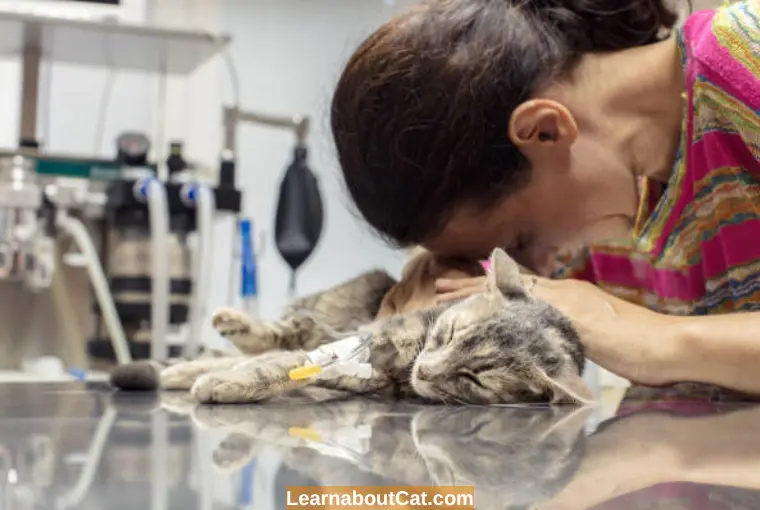
1. Creating a Comfortable Environment
When it comes to comforting a dying cat, creating a comfortable environment is key. This can include:
Providing a Quiet and Calm Space: Dying cats can become easily stressed by noise and activity, so it’s important to provide them with a quiet and calm space to rest. Can create a safe and relaxing spot in your home for them.
Providing Soft Bedding: A comfortable bed with soft and cozy bedding can provide a safe and warm space for your cat. You can add a favorite blanket or cushion to make it more comfortable.
Offering Familiar Objects: Cats can find comfort in familiar objects, such as their favourite blanket or toy. Providing these items can help them feel more relaxed and at ease during their final days.
2. Optimal Temperature
It may be difficult for cats to regulate their body temperature as they approach the end of their lives. Maintaining a comfortable temperature for your cat is important during its final days.
Keep the room at a temperature that is neither too hot nor too cold. You can use a heating pad or blanket to provide warmth if needed.
The optimal temperature for a dying cat is between 70-75°F (21-24°C). You can use a thermometer to monitor the temperature and adjust accordingly.
If your cat feels cold, you can provide blankets or a heating pad set on low to help keep them warm. However, you should avoid overheating your cat, as this may cause discomfort or even harm.
Intresting Reading: What Temperature Do Cats Like?
3. Managing Your Cat’s Pain
Old and dying cats are unlikely to require medicine. Cats with painful or uncomfortable medical conditions could need medication to feel more at peace and less suffering.
It’s important to work with your veterinarian to manage their pain effectively. This can include:
- Providing pain medication as prescribed by your veterinarian
- Offering alternative therapies, such as acupuncture or massage
- Adjusting their diet to manage any digestive issues or discomfort
Keep in mind that it’s important to keep your cat comfortable and pain-free by working closely with your veterinarian.
4. Remain by Your Cat
Cats are sensitive creatures, and they can pick up on our emotions. As your cat’s health declines, it may become anxious and scared. It’s important to provide emotional support to your cat during its final moments.
Without a doubt, you won’t want to stay away from your cat, but you should. Your cat won’t get up to follow you around if you visit close by. Assemble a heated cat bed with additional blankets or towels to give your cat a cosy, toasty place to relax. Make sure he has constant access to it as well.
Chat With Your Cat: You should keep conversing with your cat as if nothing is wrong since your voice will reassure it. Your cat will feel much more at ease and relaxed if you pet him and chat with him as you usually do.
5. Keep Water and Food Accessible And Offer Treats
Even though your cat might not want to eat or drink if he is approaching death, it is a good idea to keep something available just in case. You do not want him to start walking around the home, especially if he is ill, because he could feel thirsty.
Give your Cat a Fantastic Reward: If your cat is still interested in eating, you should give him a terrific treat that he has never had before. This will be his final meal before passing away.
6. Toilet Assistance
Toilet assistance might be helpful if your cat struggles with using the litter box. You can use puppy training pads or towels to create a comfortable and absorbent surface for your cat to lie on. You can also use a litter box with low sides or cut an entrance in a cardboard box to make it easier for your cat to access.
Ask your vet if wearing cat diapers is suitable if your cat develops incontinence. The diapers can keep your cat dry and comfy because you don’t want them to lie in pee. If your cat is physically uncomfortable, talk to your veterinarian about giving it medicine to make it feel better.
7. Contribute to Grooming
Dying cats are unable to brush and tidy their hair. While bathing your pet is probably too much for it, you may help it feel more comfortable by brushing it daily and removing any mats and knots. If your cat is in pain, go after the areas that could bother it with extreme gentleness.
7. Give Your Cat Space
Your cat wants attention in its dying hours but also needs solitude. Your cat might occasionally want to be left alone. Your cat is not welcome to have human company if it acts aggressively and scratches you. You’re stressing out your cat, which might make it feel sicker or more disturbed
8. Remain Calm
If you’re upset, your cat can also be agitated. He could grow worried as a result of his uncertainty. You don’t want your cat to feel uncomfortable in his dying moments, even though it’s impossible to do.
Should I Leave My Dying Cat Alone?
You should remain with your cat whether he or she is dying at home or being euthanized at the vet. It is difficult for them, and they need someone they can count on to be there for them.
While some cats would instead pass away beside their owners, others choose to live alone or even flee their homes.
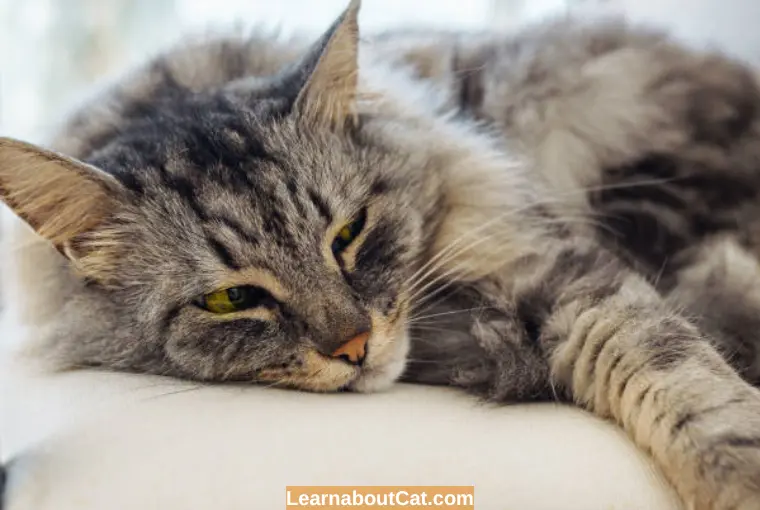
Many cats hide somewhere to be by themselves when they’re on the verge of dying because their solitary tendencies start to take over. Because of this, you’ll find that your cat hides more often and avoids being stroked or disturbed.
Throughout history, cats have been known as the masters of disguise because of their ability to hide their pain, so it makes sense that they would want to spend as much time alone as possible during their final days.
Don’t be afraid to give your dying cat as much space as it wants. Adapt your living space to the needs of your dying cat, and respect its wishes.
How to Say Goodbye to a Dying Cat?
One of the most challenging things you’ll ever have to do is to say goodbye to your terminally ill cat. Every circumstance will be different, but being ready for the inevitable is the most significant way to give your cat the most peaceful farewell.

Remember to remain calm and composed when saying goodbye to your cat. Talk softly to your cat while holding her, stroking her gently, and patting her on the head. Embrace their love and let them know how much they mean to you.
Dealing With Grief
When we lose a pet, we are left with deep emotions and with a lot of pain.
- Permit yourself to feel the feelings you’re having. It’s common to experience sadness, rage, and guilt. Taking care of an aged or ill cat can be difficult, but remember that you did your best. This will help you go through the mourning process when the time comes.
- If your cat is strong and healthy enough, try to cross any items off your list that are still undone. Reliving memories and sharing them with your cat might make you feel more at peace and help you get ready for your pet’s passing.
- When you are aware of impending mortality, it might be challenging to live in the present because you are too preoccupied with thinking about it. Spend time with your cat while combing, caressing, or simply sitting with them instead of worrying about the emotional load.
Since your cat can sense your emotions, try to maintain as much of a brave front as possible to make your pet feel at ease during its final days. You should feel more upbeat about the future due to doing this.
Things To Do With Your Cat Before They Die
In later years, your cat will not likely be very active. While you should spend as much time with it as possible, remember to respect its bounds and limit your actions to what it is capable of. Before your cat passes away, you can take the following steps:
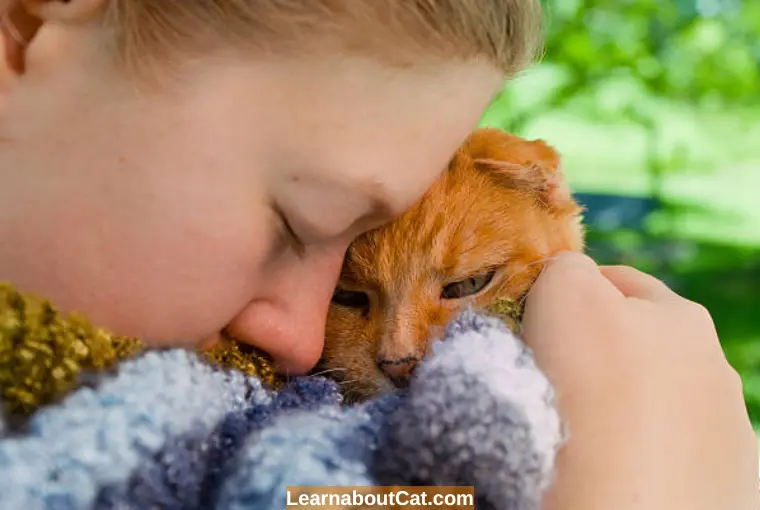
- Treat-Feed, Your Cat.
- Sit in the garden with your cat so it may enjoy the sunshine and fresh air.
- Take photos, so you have mementoes.
- Let it sleep in the area of the house that it prefers.
Give your family a chance to say their final goodbyes one at a time when your cat is ready to pass away and urge them to tell their pet how much they love them. They’ll always have this pleasant recollection to think back on.
Because it was too hard at the time, many owners regret missing the opportunity to say goodbye. When your cat passes away, it must have its loved ones at its side.
Frequently Asked Questions
What do cats do just before passing away?
Feline buddy becomes more agitated and sluggish and shows sedentary behaviour. Sleeping patterns also get disturbed as they sleep more than usual. Leg muscles tend to weaken as they age.
Do cats know when they are dying?
Cats are perceptive animals that can notice things that humans cannot. They have a keen sense of their bodies and can tell when anything is awry. They are far better at catching cues than humans since they have superior vision, hearing, and smell capabilities. Individuals can realise their bodies are weakening and failing if they notice a change, such as that they’ve started to smell differently.
Cats have the same ability to sense pain and suffering. Even if they are unaware that they are about to pass away, they may sense that something dreadful is happening to them if they feel very ill. They will consequently exhibit unfavourable behavioural features.
How long does it take for a cat to die?
The length of time it takes for a cat to die naturally can vary depending on their condition. However, there are different stages a cat can go through, so it can take anywhere from 3 days to 3 weeks. To end the suffering your dying cat is experiencing, euthanize it humanely.
How do I know when it’s time to euthanize my cat?
The health and well-being of your cat should be a priority. If their condition is not improving, and their suffering cannot be managed It’s crucial to consult with your veterinarian to determine the best course of action. They can provide advice on whether your cat needs to be euthanized based on their assessment of its condition.
Can I hold my cat during euthanasia?
Yes, many pet owners choose to hold their cats during euthanasia to provide comfort and support.
How can I memorialize my cat after they pass away?
Create a scrapbook or photo album as a memorial. A charitable organization or shelter can also be a good place to donate in memory of your cat.
Can I euthanize my cat at home?
Only licensed veterinarians should perform euthanasia. Your veterinarian can help you choose the best option for your cat based on your options.
Final Words!
Losing a cat is never easy, but knowing how to comfort a dying cat can help make their final moments as comfortable and peaceful as possible. Creating a calm and comfortable environment, providing emotional support, and keeping your cat comfortable can all help ease their transition.
You will always hold a special place in your heart for your cat, so give yourself time to grieve and process your emotions. By providing comfort and love to your cat during their final moments, you can ensure that they pass away knowing how much they were loved and cared for.
Related Posts:
Who is Isabella?
My name is Isabella, and I am a dedicated and knowledgeable cat enthusiast. With years of experience caring for cats and a deep love for felines, I made a mission to help other cat lovers navigate the challenges of cat ownership.

